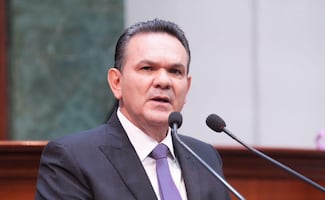Más Información

Jueza frena proyecto de Royal Caribbean en Mahahual, Quintana Roo; bloquean uso de suelo por riesgo ambiental

Tras salida de Adán Augusto, Monreal revela que tiene su renuncia sobre la mesa; "cuando ya no eres útil tienes que retirarte", dice

¿Qué es el Sistema Nacional Anticorrupción, cómo funciona y desde cuándo opera?; Sheinbaum va por modificarlo

Dictamen de jornada laboral de 40 horas es una “simulación”, acusan colectivos; exigen su retiro con mitin afuera del Senado

Sergio Torres, diputado de MC, presenta leve mejoría tras ataque en Culiacán; continúa bajo tratamiento médico
Mexican billionaire Carlos Slim has put two of his grandchildren on boards of his companies, a major step in the succession of one of the world's largest family business empires.
Daniel and Rodrigo Hajj Slim, both in their early 20s, are sons of Slim's second-eldest daughter Vanessa and Daniel Hajj, chief executive of the family's most valuable asset, América Móvil (AMXL.MX). The sons were made directors at smaller companies.
Slim has said publicly that his succession plan is done, having put his three sons in key positions of his telecoms-to- banking empire, worth some US$50 billion, and transferring much of his wealth to his children.
But building a bridge to the next generation, which appears to be part of the longer-term plan, is notoriously tricky.
Daniel Jr.'s appointment to the board of Slim-owned metals miner Minera Frisco (MFRISCOA1.MX) was approved by shareholders in April 2015, according to a public filing to Mexico's stock exchange. The Slim family holds a direct stake of 78 percent.
Rodrigo joined the board of Spanish real estate business Soinmob Inmobiliaria Espanola SA in March this year, according to a filing in Madrid.
As in the United States, most businesses in Mexico are family-run. But barely 5 percent of them make it to the third generation successfully, according to Hector Macias, a corporate governance expert at PWC.
"Transcending generations is not very common. It's very complicated," Macias said, explaining that sometimes younger generations are not interested or have very different ideas, disrupting the hoped-for transition.
Macias noted that the way family companies survive is by getting relatives in young, as Slim appears to be doing.
Unlike its northern neighbor, where less than one-third of S&P 500 companies are founding family-owned, according to consultancy McKinsey & Co.'s Family Business Practice, almost all of Mexico's biggest listed firms are controlled by a family.
Bernard Black, a professor of law and finance at Northwestern University who has researched international corporate governance, said that while family businesses all over the world will put relatives on their boards, it was unusual to appoint them at such a young age.
"It would be much more usual when you've got younger family members to start them out in positions in the company," Black said. "What are they bringing to the board?"
Arturo Elías, Slim's spokesman and another son-in-law, declined to comment on the appointments or on whether Daniel and Rodrigo were studying or working.
Despite their entry to the empire, the grandchildren are not yet named as significant shareholders in América Móvil, its latest U.S. Securities Exchange Commission filings show.
Diego Enrique Osorno, who recently published an unofficial biography of Slim, said the move was not that surprising as Slim's children and sons-in-law were also in their 20s when they entered the family companies.
"He's said he wants to create a family business. I think he must be keen for the other grandchildren to get involved," Osorno said.
The nomination of the Hajj Slims to the boards was first reported by Spain's El Confidencial newspaper.
Noticias según tus intereses
[Publicidad]
[Publicidad]









